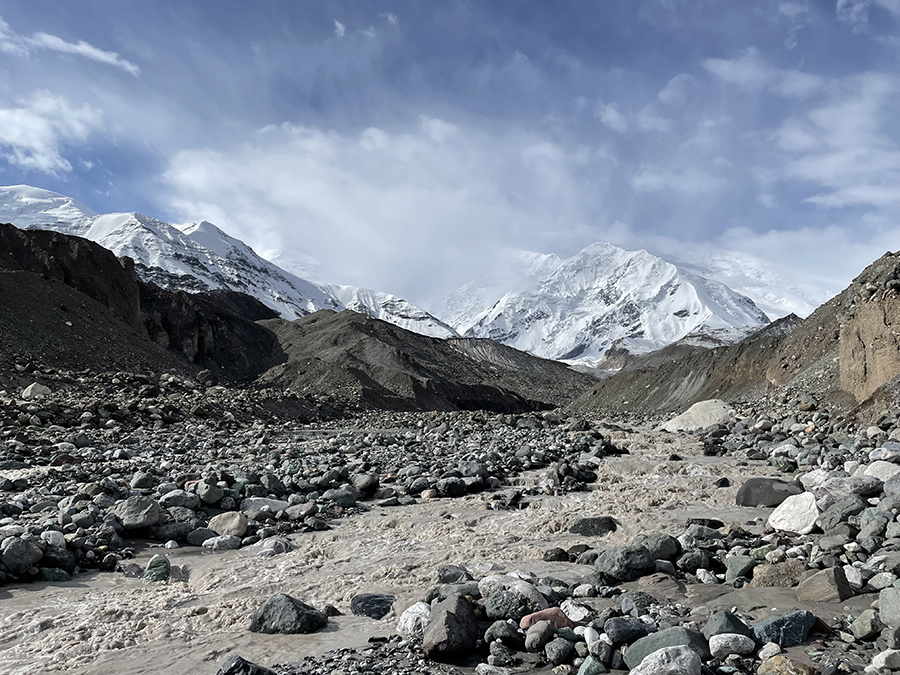By Kendall Cooper, Florida State University News
Florida State University researchers are part of the first global study on glacial organic carbon and have found that just like the snowflakes that form them, no two glaciers are identical.
The team, which included Department of Earth, Ocean and Atmospheric Science postdoctoral scholar Amy Holt and Professor Robert Spencer, analyzed the molecular composition of organic carbon from 136 mountain glaciers in 11 regions across six continents. They found that each glacier region has a unique organic carbon composition and that human activity in the area affects the type of organic carbon exported to rivers, which has implications for carbon’s role in the surrounding aquatic environments. These findings were published in Global Biogeochemical Cycles, a journal of the American Geophysical Union.
“This work uncovered that glaciers are really diverse, and they likely have variable roles in the carbon cycle, or the planet’s continuous recycling of carbon,” said Holt. “Glaciers and mountain ecosystems are experiencing some of the most extreme effects of climate change. It motivates me to know that my research contributes to our understanding of how these environments may change into the future.”

Located in alpine areas, mountain glaciers are smaller than the massive expanses of ice that form the world’s two remaining ice sheets in Greenland and Antarctica. By highlighting the role of geographic location on carbon stored in glaciers and exported from them as they melt, this research enhances understanding of glacial meltwater’s role in downstream ecosystems, which is critical for the health of global fisheries.
The researchers logged hours of strenuous, high-altitude hiking in extreme weather to collect glacier meltwater samples at the source. Holt visited roughly 40 glacier sites throughout Alaska in North America, Ecuador in South America, and Kyrgyzstan in Central Asia. The remaining sites were in the European Alps, Chile, Greenland, Nepal, New Zealand, Norway, Russia and Uganda. In addition to FSU, members of the 12-scientist team hail from the Swiss Federal Technology Institute of Lausanne and the University of Alaska Southeast.
“Many people assume glaciers are hostile, inert environments, but surprisingly, their organic carbon pool is really complex and varied,” said Holt, who completed her doctorate in environmental science at FSU in May 2024 under Spencer’s supervision. “These tiny organic carbon compounds help form the base of aquatic food webs as they can be an energy source for microorganisms, which release carbon back into the atmosphere when they respire.”
Glaciers receive organic carbon from a variety of sources, such as microbial activity on the glacier surface, as well as wind-deposited carbon from soils and fossil fuel combustion, which coats the glacier in industrial byproducts. As ice glaciers melt, a process exacerbated by climate change, carbon stored within and on the ice is released to downstream ecosystems.

“There has been huge debate about the source of glacial organic matter globally,” Holt said. “Past studies in different glacier regions have shown glacier organic carbon may be predominantly derived from microbes on the surface, whilst others have suggested it reflects fossil fuel combustion byproducts and recent human activity. This research reconciles these competing perspectives, showing that glacier organic matter is regionally distinct and derived from both sources.”
Areas with a history of industrial activity such as Alaska and Nepal — home to Mount Everest, the world’s highest peak — have higher relative contributions of carbon sourced from fossil fuel combustion as opposed to microbial activity. By contrast, samples from the remote regions of Greenland and New Zealand, for example, where there is less industrial impact, consisted primarily of carbon-containing matter produced by microscopic organisms within the glacial ecosystem.
“In the short term, the material exported in glacier meltwaters may act as a source of biologically available carbon for rapid use by organisms in downstream environments,” Spencer said. “In the long term, many glaciers will decline, shrink and ultimately disappear due to ice loss. There are important ramifications here for receiving waters that include productive fisheries, as changes in the carbon’s sourcing and composition could affect the health and productivity of these ecosystems.”
This research was supported by the National Science Foundation, the Winchester Foundation, the International Associate of Geochemistry, the FSU-headquartered National High Magnetic Field Laboratory, and the NOMIS Foundation, a private Swiss foundation that supports scientific endeavors across disciplines.
To learn more about Holt and Spencer’s work and research conducted in FSU’s Department of Earth, Ocean and Atmospheric Science, visit eoas.fsu.edu.
This piece was originally published at https://news.fsu.edu/news/science-technology/2025/01/14/fsu-biogeochemists-discover-glaciers-carry-unique-molecular-fingerprints-influence-on-carbon-cycle/. Banner photo: Mendenhall Glacier is located in southeast Alaska and served as one of the sampling sites for postdoctoral scholar Amy Holt’s research. At more than 13 miles long, the glacier is a popular tourist destination for those who visit Juneau. (Courtesy of Amy Holt).
Sign up for The Invading Sea newsletter by visiting here. To support The Invading Sea, click here to make a donation. If you are interested in submitting an opinion piece to The Invading Sea, email Editor Nathan Crabbe at nc*****@*au.edu.



